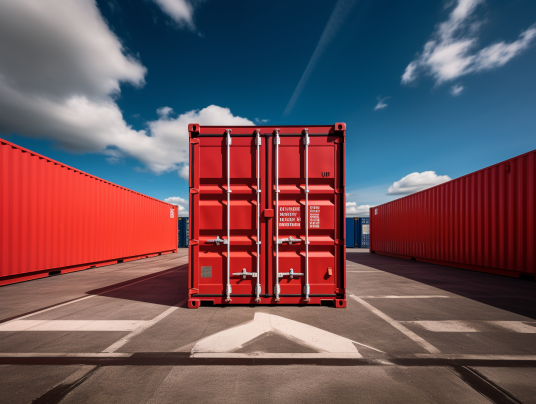Shipping containers are quickly growing in popularity due to their versatility and relative affordability. Purchasing a pre-owned container can be a cost-effective and practical choice for various storage needs, and can form a base for a renovated tiny home, cabin, tool shed, and more. However, it’s very important to understand a few things before making a purchase, so that you don’t end up with any unwelcome surprises (leaky container, anyone?).
Here’s what you need to know before buying a used shipping container:
- Structural Integrity Inspection: Check for structural flaws such as rust, dents, or bent frames. These issues could compromise the container’s integrity and cause long-term problems.
- Water Damage Assessment: Inspect for signs of water damage, including rust or corrosion. Water ingress could lead to mold or compromise the container’s weatherproofing.
- Door Functionality Evaluation: Ensure the doors open and close smoothly without any misalignment. Faulty or rusty door mechanisms might affect accessibility and security.
- Quality of Seals and Locks: Check the condition of the seals and locks. Damaged or worn-out seals could lead to water ingress, while faulty locks compromise security.
- Wear and Tear Examination: Look out for signs of excessive wear or heavy damage, which could affect the container’s overall reliability and lifespan.
- Environmental Suitability Assessment: Consider the container’s past environment and any potential effects of weather exposure. Ensure the container is fit for your intended use.
- Reputable Supplier Selection: Opt for a reputable supplier like Ccansam to minimize potential risks. Their commitment to quality standards ensures you receive a container that meets high-quality benchmarks.
Structural Integrity
When examining a used shipping container, thoroughly inspect the structure for signs of rust, dents, or bent frames. These issues could compromise the container’s structural integrity, potentially leading to weaknesses or vulnerabilities that might impact its durability and long-term usability. Focused attention on structural soundness is crucial to ensure the container’s reliability and safety for storage or transportation needs.
Water Damage
A critical aspect of a container inspection involves checking for signs of water damage, particularly rust or corrosion. Such damage can indicate past or ongoing water ingress, potentially leading to mold growth, compromised structural integrity, and a reduction in the container’s weatherproofing abilities. Identifying and addressing water damage is essential to prevent potential long-term issues.
Door Functionality
The functionality of container doors is paramount. Ensure they open and close smoothly without misalignment or significant resistance. Faulty or rusty door mechanisms can impede accessibility, making loading and unloading challenging, and may compromise the container’s security and protection against external elements.
Quality of Seals and Locks
Pay close attention to the condition of the container’s seals and locks. Damaged or worn-out seals can permit water ingress and compromise the container’s weather resistance. Additionally, faulty or inadequate locks can pose security risks, potentially leading to unauthorized access or theft. Properly functioning seals and locks are essential for the container’s safety and protection of stored items.
Wear and Tear
Examine the container for signs of excessive wear and tear or substantial damage. Identifying wear on the flooring, walls, or ceiling is crucial, as extensive wear might impact the container’s reliability and structural integrity. Thorough examination helps in assessing the container’s overall condition and estimated remaining lifespan.
Environmental Suitability
Consider the container’s past environmental exposure and its potential impact on its condition. Exposure to extreme weather conditions might result in accelerated deterioration or corrosion. Ensuring the container is suitable for your intended use, taking into account the environmental factors it has encountered, is crucial for its long-term functionality and reliability.
Reputable Supplier
Choosing a reputable supplier, such as Ccansam, is a fundamental step in minimizing potential risks associated with used container purchases. A trusted supplier follows rigorous inspection standards, ensuring that containers meet high-quality benchmarks. Working with a reliable and reputable supplier increases the likelihood of obtaining a used container in good condition, meeting safety standards, and suiting your specific needs.

